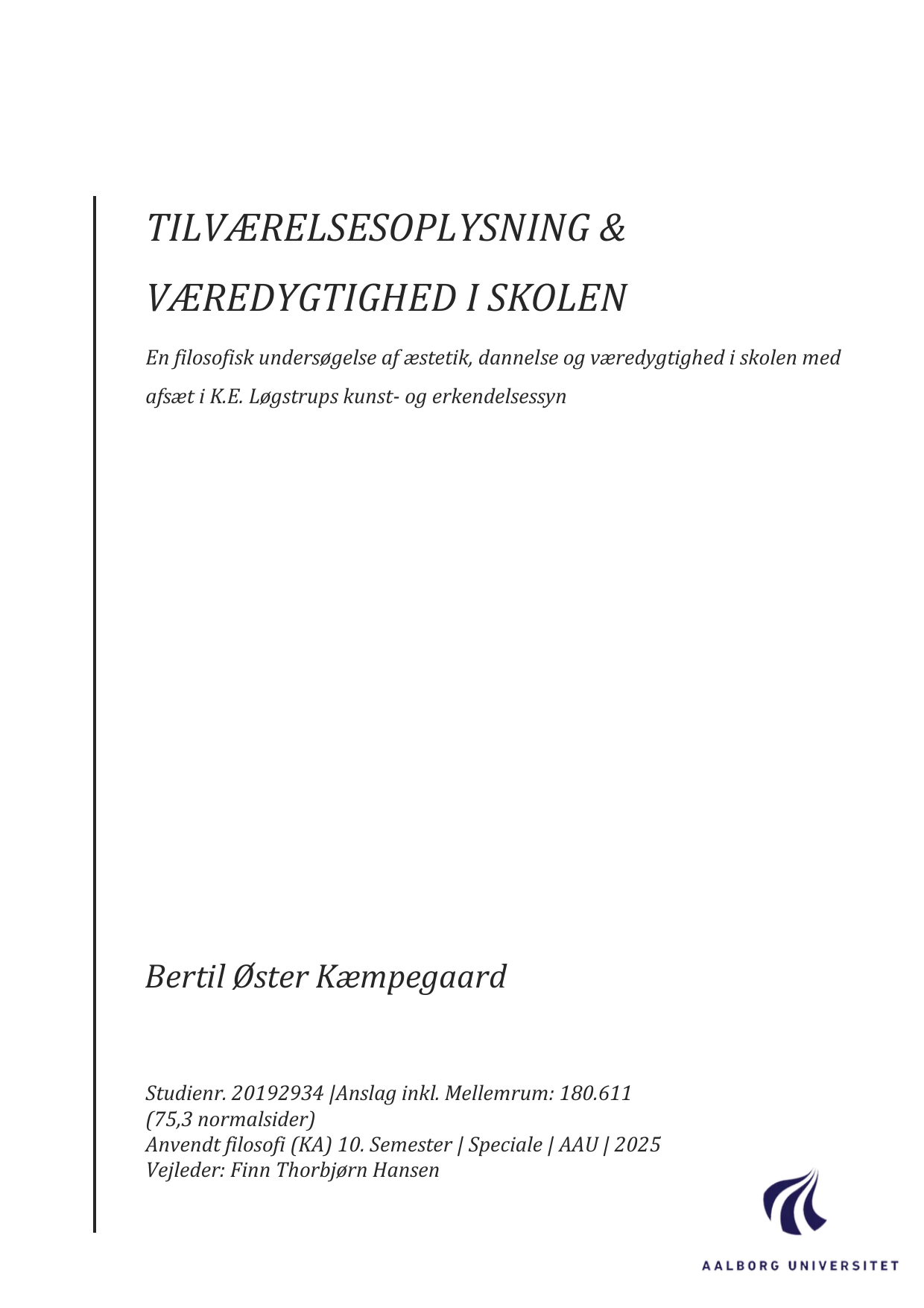
Tilværelsesoplysning & Væredygtighed i Skolen: En filosofisk undersøgelse af æstetik, dannelse og væredygtighed i skolen med afsæt i K.E. Løgstrups kunst- og erkendelsessyn
Oversat titel
Existential Enlightenment & Sustainable Being in School
Forfatter
Semester
4. semester
Uddannelse
Udgivelsesår
2025
Afleveret
2025-06-02
Antal sider
75
Abstract
This thesis explores the potential of an aesthetically organized school, where existential an ethical thought establishes the schooling practice, based on K.E. Løgstrup’s philosophy of art and cognitive theory. The basis of the purpose of school also stems from Løgstrups philosophical perspective of existentiel enlightenment (tilværelsesoplysning), which refers to the idea that the primary purpose of school and education is not to merely transmit knowledge or develop competence-based skills. Instead, the purpose of school is to illuminate or enlighten the child’s understanding of life itself. Due to own experience and practice in the Danish school educations system, applied with an insight into philosophy and the arts, Kæmpegaard presents alternative ways of thinking the fundamental concept of schooling and education, combined with contemporary tendencies in education that emphasize competence-based learning and measurable outcomes. This study proposes an alternative educational framework grounded in existential resonance, existential openness, aesthetic experience, and ethical responsibility, where the school engages in existential and ontological perspectives, combined with an aesthetic-based organization. Central to the thesis is the notion that education should not only prepare students for the labor market but should foster a notion of existential and ethical living that is responsive, relational, and attuned to the complexity of being. The concept of the aesthetical organization (den æstetiske organization) is based on a rethinking of the school structure and development. This organization is as a thought experiment and theoretical research project, proposes a philosophical and pedagogical model that reimagines the school as a place for artistic impression and aisthesis-based cognition (aisthesis erkendelse). This aesthetical and ethical view and philosophy is rooted in attunement (stemthed) and sensory aesthetic impression. This thesis argues that such experiences, where a deep impression and aisthesis view occur, are ethically formative and reveal the child’s existential positioning and coherence in the world. The aesthetic perspective, combined with existential theory of thought, proposes a new way thinking school and organization, where the child is central for the schooling practices. The existential perspective is formulated first and foremost by Martin Heidegger’s perspective of wonder, where an existential openness (eksistentiel åbenhed) is a way for the child to let the world reveal itself. This existential openness to the aesthecial impression, attunement and being seeks an existential response or thought of being by the individual. This perspective proposes Hartmut Rosa’s theory of existential resonance (eksistentiel resonans) as the revealing of wonder and enlightenment of being. Heidegger’s and Rosa’s theory of wonder and resonance support the view that meaningful education emerges in dialogical encounters, where students are affectively and existentially ‘spoken to’ through the relationship to other people and phenomena and can respond with their whole being. This combined theory of aesthetics, arts, attunement, existential openness, and existential resonance purposes a new understanding of being-sustainability (væredygtighed) as a key concept in conjunction with Løgstrup’s idea of existential enlightenment. Methodologically, the thesis engages with a hermeneutic and phenomenological approach, interpreting philosophical texts and theorizing of the different opposed views of ethics, being and existential theory. Where the aesthetic elements such as music, storytelling, and artistic reflection, opens a new understanding of the aesthetical school organization, which implements existential enlightenment and being-sustainability. Through this lens, the thesis examines how aesthetic resonance fosters existential openness, wonder, and ethical responsiveness in the child’s schooling. The study concludes that the aesthetical and philosophical educational practice holds an aesthetical requirement (æstetisk fordring) towards the child and should therefor resist the overwhelming instrumentalization of competence-based learning and instead nurture an ethically grounded, existentially sustainable life for the child. In such a constructed organizational model the thesis provides, the school becomes a space not only for knowledge acquisition but for cultivating the art of being human.
Emneord
